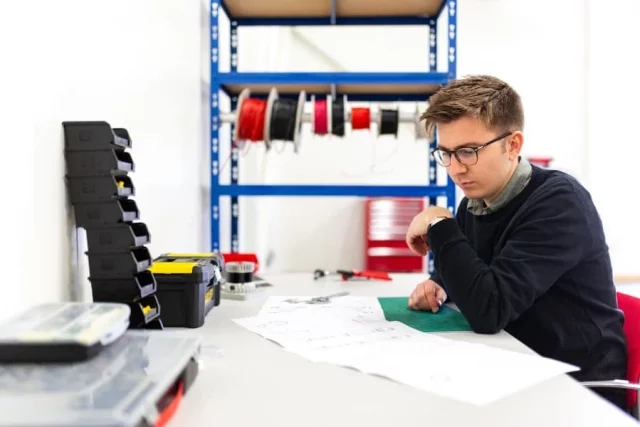Choosing a career in engineering can be a daunting task. With so many specialties to choose from, how do you know which one is right for you? The key is to find a niche that fits your personality and interests. Here are some tips on how to choose the right engineering specialty for you.
Choose A Highly-Paid Career
One of the most important things to consider when choosing your engineering specialty is how much money you can make. Engineers are some of the highest-paid professionals in the country, and it’s possible to enter a highly lucrative field even at entry-level. However, not all engineering fields pay equally well and some offer better opportunities for advancement than others. You can become a railroad engineer because of the high starting salary, and a steady job. On the other hand, a career in aerospace engineering will offer plenty of room for growth and earning potential.
Consider your long-term financial goals when choosing an engineering specialty. Some of the other highest-paying specialties include materials science, petroleum engineering, and aerospace engineering.
Do Your Research
Once you’ve narrowed down your list of potential engineering fields, it’s time to do some research. Find out what type of work is involved in each specialty and whether it aligns with your interests and skillset. You should also look into the job market for each field to get an idea of prospects. If you’re interested in a particular field but there are few jobs available, you may want to consider another specialty. It’s also important to find out what type of work environment you’ll be entering.
Some engineers work in office settings, while others may spend most of their time in the field. Consider your preferences and whether you’re comfortable with a more hands-on approach before making your final decision.
The Niches In Engineering
One of the biggest considerations when choosing an engineering specialty is the range of niches available. Some of the most popular specialties in the field include mechanical engineering, civil engineering, aerospace engineering, and petroleum engineering. Each one offers a unique combination of challenges, opportunities for growth, and earning potential.
- Mechanical Engineering: Mechanical engineers are involved in a wide variety of projects related to manufacturing and product design. They may work on everything from vehicles to consumer electronics to power plants, helping to bring new products to market or improve existing ones. Civil engineers are involved in planning and designing construction projects such as roads, bridges, buildings, water systems, airports, and more.
- Aerospace Engineering: Aerospace engineers apply their technical knowledge and skills to projects involving aircraft and spacecraft. They may work on everything from small drones to large commercial jets, helping to design and build new vehicles or improve existing ones.
- Petroleum Engineering: Petroleum engineers are involved in the extraction, production, and transportation of oil and gas. They work closely with geologists and other engineers to develop new ways to extract these resources from the earth and get them to market efficiently.
Keep Your Options Open
Even if you’re set on a particular engineering specialty, it’s important to keep your options open. The field is constantly changing, and new specialties are always emerging. If you’re flexible in your career choices, you’ll be better equipped to adapt to the ever-changing landscape of engineering. Additionally, keeping your options open will give you a better chance of landing a job in today’s competitive market. When choosing an engineering specialty, it’s important to consider your long-term goals and the job market.
However, it’s also important to be flexible and keep your options open. With so many specialties to choose from, you’re sure to find one that’s a perfect fit for you. Keeping your options open will surely land you a role you will like.
Work On A Team
All engineers work on teams to some degree, but those who choose a specialty that requires intensive collaboration can benefit greatly from their experience. For example, chemical engineers working with other chemists or biological engineers having close interactions with doctors will gain valuable skills working as part of a team while performing their duties.
If you’re someone who enjoys working with others, consider a specialty that emphasizes teamwork. You’ll gain valuable skills and experience while working on projects with other engineers. For example, some of the most collaborative specialties include petroleum engineering, biomedical engineering, and software engineering.
Depending On Your Background
Your background can play a major role in your specialty choices, particularly if you’re transitioning from one field to another. If you are new to the industry, research specialization areas related to your previous experience. For example, someone with a background in farming may be interested in agricultural engineering or environmental engineering so they can apply their knowledge of farming to different fields.
On the other hand, engineers with little or no practical experience may want to pursue an educational degree before getting started in their careers. Your background will also determine the educational path that’s best for you, whether it’s a formal degree in engineering or specialized classes offered through continuing education programs.
Careers That Don’t Require Higher Education
Some engineering careers don’t require higher education, but they may require certification or specific experience. For example, civil engineering technicians typically only need an associate’s degree, while nuclear engineers must have a professional engineering license.
Consider your career goals and whether you’re willing to invest the time and money into getting a higher education before choosing an engineering specialty.
Additionally, many engineering careers don’t require a specific specialty and allow you to work in multiple fields. If you’re interested in a particular field but don’t want to specialize, consider pursuing a general engineering degree.
The most important thing to remember when choosing an engineering specialty is that there is no wrong choice. The key is to find a field that interests you and offers good growth opportunities. With so many options available, choosing an engineering specialty can be daunting. However, by doing your research and keeping your options open, you’ll be sure to find a field that’s a perfect fit for you. Once you’ve decided on a specialty, you can begin working towards your long-term goals and building a successful career in engineering.














